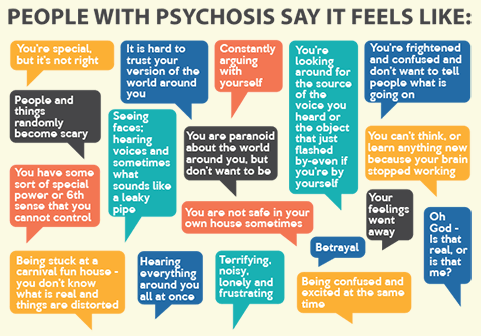
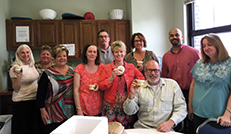
Everybody Screams for Graeter’s!
The Montgomery County ADAMHS board sent the PLACES team a special treat of Graeter’s ice cream to celebrate National Social Worker Month in March. ADAMHS thanked PLACES for “your continued dedication, selflessness and kindness to the community.”
Annual Picnic for Residents, Clients and Tenants
June 23, 2016 from 11:30 am – 3:00 pm Hill & Dales MetroPark in Kettering
A Linden Family Favorite
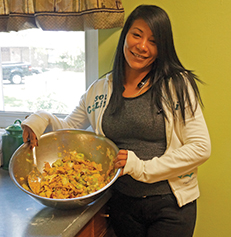 Christine helps ensure that at Linden, healthy meals and snacks are the norm.
Christine helps ensure that at Linden, healthy meals and snacks are the norm.Linden has a binder full of recipes lovingly compiled over time from magazines, newspapers and hand-written notes. “We have developed our favorite menus with a lot of trial and error,” said residential advisor Christine Escribano. Here is one of her favorites that is popular with Linden residents.
Mexican Chopped Chicken Salad
» 6 cups shredded lettuce
» 1 bag (3 cups) tortilla chips, crushed
» 2 cups cubed cooked chicken
» 1-1/2 to 2 cups canned kidney beans, rinsed and drained
» 1/2 cup Ranch dressing
» 1/2 cup shredded cheddar cheese
» Tomatoes and olives for garnish
Combine all ingredients in large bowl. Garnish with
tomatoes and olives. Makes up to 6 servings.
(Source: Hungry-Girl.com)
What Is Mental Health First Aid?
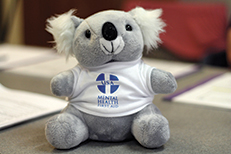 ALGEE is the mascot bear of Mental Health First Aid.
ALGEE is the mascot bear of Mental Health First Aid. Mental Health First Aid (MHFA) is a public education program that introduces trainees to risk factors and warning signs of mental illness, builds understanding of their impact, and overviews common supports. The course uses role-playing and simulations to demonstrate how to offer initial help in a mental health crisis and connect persons to the appropriate care.
Mental Health First Aid teaches a five-step action plan (ALGEE) to offer initial help to people with the signs and symptoms of a mental illness or who are in a crisis. Anyone can take the eight-hour course. For more information contact ADAMHS of Montgomery County.
» Assess for risk of suicide or harm
» Listen nonjudgmentally
» Give reassurance and information
» Encourage appropriate professional help
» Encourage self-help and other support strategies
(Source: Mental Health First Aid USA)
Resident Awards
Adult Care Facilities Residents of the Year
Gascho Gardens: Tonya R.
Marty’s House: Danny P.
Randolph House: Michael G.
Trotwood: James G.
Housing First Tenants of the Year
Belvo: Kailonia J.
Tangy Court: Kathleen C.
Imperial Court: Verdel J.
Cobblegate: André H.
Supportive Living Program Graduates
Tina A., William B., Michael B., Michael B., Angela B., Jonathan C., Erik E., LaShanda F., Marie G., Krishna H., Ronnie H., Tiffany H., John H., Amy K., Anthony L., Sandra L., Robert M., Nicole M.-A., Anita M., Glenda N., Nina P., Andrea P., Mark P., Kim R., Debra S., Jim S., David S., William VN., Stephanie W.
Caring Staff Makes Linden a Real Group “Home”
Advisors and aides are critical to the successful operation of PLACES adult care facilities (ACF). Meet two staff members who create a family-like environment at Linden.
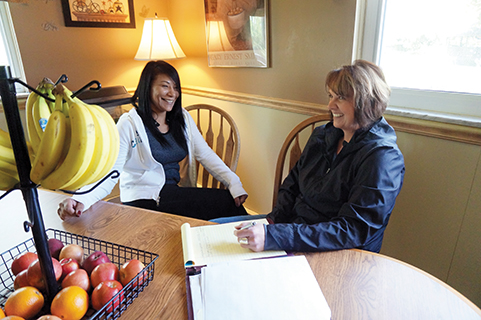
Christine Escribano (left) and Julie Caskey have spent a total of 23 years creating a
homelike environment at Linden, a former apartment house that now houses 12
mentally ill residents.
When you are diagnosed with severe and persistent mental illness, finding a safe, family-like environment for long term care is a challenge. Many people with bipolar or schizoaffective disorder or undifferentiated schizophrenia wind up on the streets or seeking space in a shelter where they may have to arrive by 3 p.m. in order to be allotted a bed for the night, then be required to leave by 8 a.m. the next morning.
At Linden, the largest ACF that PLACES operates, 12 residents ages 32 to 65 have a comfortable, secure place to live in a neighborhood setting. They are free to leave the premises, and several hold jobs in a sheltered workshop four days a week.
Making it all hum as smoothly as possible are three full-time advisors and two aides. Christine Escribano is an advisor who has worked at Linden for the past 11 years on the 8 a.m. to 6 p.m. shift. Her job is spending time with residents day-to-day, reminding them to take their medications, taking them to doctor’s appointments, shopping with them to select healthy snacks, and preparing wholesome lunches and dinners each day from scratch.
Christine moved here from Boston, where she was a CNA and a job coach at a developmental disabilities organization. “I loved being in human services,” she said. She encountered PLACES at a job fair in 2005 and has been at Linden ever since.
“You have to be a jack of all trades,” Christine said about her role as an advisor. “You have to make smart decisions. Some people may not want the responsibility or be able to adapt to constantly changing situations. PLACES has high expectations of staff because we are responsible for residents’ safety, security and overall health.”
While aides work the overnight shift, advisors like Christine are with the residents all day long. “We have an Activity Board that plans special trips to places like the Cincinnati Zoo or Dave & Busters,” Christine said. “Winter is a time for arts and crafts because it’s harder to go out. Three of our 12 residents are really into the arts, but everyone enjoyed making tie-dyed shirts.” These kinds of activities are therapeutic and help pass the time.
Spending all day around mentally ill people can be stressful. “We do a lot of teaching, training and modeling healthy lifestyles, and sometimes residents don’t listen,” said Julie Caskey, manager of Linden. “You often have to repeat your guidance to residents, and they can become agitated. Music is a great stress reliever for us. It’s very important to the quality of life for both residents and staff. We listen to a great range of styles. One of our residents even plays the guitar and harmonica.”
Julie spent 3 years with PLACES from 1996-99, then left to become a case worker, returning in 2007. She knew the administrative staff and was happy to rejoin some of the same residents she had missed. “I wouldn’t trade it for anything,” she said.
Julie stresses the need to find staff who can be proactive, self-directed and flexible. “You are given the tools, but you need to take the initiative,” she explained. “For example, you need to know what to do if you have downtime. Crises can happen: a resident could fall or you may need to call the police. Our staff even makes insurance inquiries when they see that a resident doesn’t have the right coverage for their needs.”
Staff retention can be a challenge with these kinds of working conditions. And finding new employees can be difficult, as the job require a broad range of skills, solid judgment and the right temperament. “I don’t think you can study for this job,” Christine said. “It’s either in your nature to nurture and provide a safe environment, or it isn’t.”
Aides and advisors tend to be women, maybe because they demand multi-tasking and nurturing skills common to mothers. But Julie would like to see more men enter the field. “We have 6 male and 6 female residents, but only one male staff member,” she said. “It would be helpful to have more male role models for our residents, someone for our guys to talk to. There aren’t a lot of male case workers in the community either.”
PLACES currently has a number of openings for full-time, part-time and on-call staff. Qualified jobseekers may go online to learn more. Openings are posted on this website, GreaterDaytonWorks.com and other local websites.
Mental Health Month Observed with First Aid Training
Mental Health First Aid has grown to be an international movement. Since 2008 more than 550,000 people have been trained in the U.S.
For more than 65 years, May has been designated as Mental Health Month, a time to raise awareness of this important public health issue.
While many PLACES staff members have dedicated their careers to supporting clients with mental health problems, they took an additional step this spring with “first aid” training that allows them to identify emergent illnesses or imminent crises in the community or workplace.
The Alcohol, Drug Addiction and Mental Health Services board of Montgomery County (ADAMHS) is providing two-day training sessions to PLACES staff, including caregivers, counselors and administrators. Their certifications are valid for three years.
“It’s like CPR training for mental health,” explained PLACES executive director Roy Craig. “We consider having a good background in mental health essential to serving our client base.”
The training was provided as part of a new partnership that began in March between PLACES and ADAMHS on the East Dayton AWARE Project, which trains people in Mental Health First Aid in the 45403 and 45410 ZIP codes. Youth targeted in these ZIP codes made twice as many hospital ER visits as the entire county. Overall, heroin overdoses were three times higher in these areas.
In exchange for training, PLACES provides useful feedback to ADAMHS staff and has an employee participate on their advisory board.
Mental Health First Aid was launched in the U.S. in 2006 and has since received the support of Congress and First Lady Michelle Obama.
“The course gives people the skills to help a family member struggling with addiction, the knowledge to talk to a co-worker suffering from depression, and the confidence to intervene with a friend contemplating suicide,” according to Linda Rosenberg, President and CEO of the National Council for Behavioral Health.
Man’s Best...Therapist?
The newest member of the caregiving team at Belvo House is a four-legged “therapist” named Louie Von Goldendoodle. He makes 30-minute “house calls” each month to the eight clients of this Permanent Supportive Housing facility.
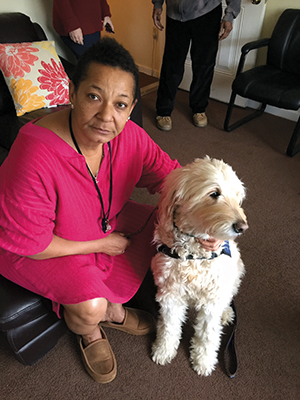 Louie Von Goldendoodle, a trained master therapy dog, visits Housing First tenants at Belvo monthly to brighten their day.
Louie Von Goldendoodle, a trained master therapy dog, visits Housing First tenants at Belvo monthly to brighten their day.Louie is a six-year-old Golden Retriever and Poodle mix owned by Debbie Boomershine, a volunteer with the Miami Valley Pet Therapy Association. Specially trained to visit hospitals, nursing homes and other care facilities, Louie started making visits to Belvo at the beginning of this year.
“Several of our clients love pets, but are not able to keep them here,” said Belvo case manager Sara Beal. “I was discussing their request with Shannon [Root] and Tracey [Jones], and we came up with the idea of contacting Miami Valley Pet Therapy. I chose Louie because he appeared calm. In fact, he does a great job of calming one of our clients who exhibits manic behavior. Debbie has told me about a non-verbal nursing home patient he visits who speaks only to him.
“About half of our clients engage with him when he visits, petting him and even dancing with him,” she said. “He generally visits our common area, but has even gone upstairs to the rooms of clients who can’t do stairs. We all love that he comes dressed in costumes for different holidays.”
Louie was featured in the “Unsung Heroes” column of the Dayton Daily News in December 2015. He is one of 125 certified pet therapy teams that MVPTA offers to 95 hospitals, nursing homes, assisted living facilities, libraries, rehab centers and other residential programs in a six county area. Teams consist of a human volunteer and their dog, cat, rabbit or other hand-held pet. For more information or to volunteer, contact www.mvpta.com or 937-286-0028.
Celebrating Their Achievement
PLACES is proud of its clients, tenants and residents who have worked hard to achieve their goals in education, vocational training, community service and recovery. Here are some who recently received awards.
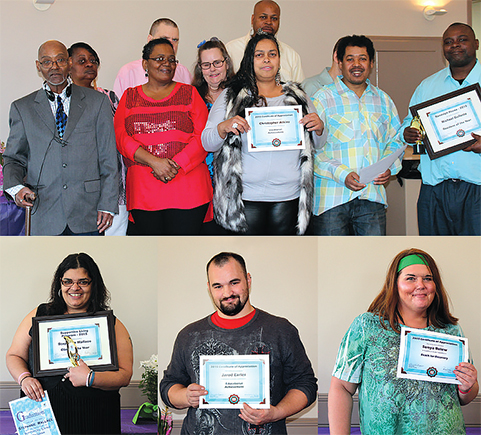 Top: Group of clients and tenants celebrating their Vocational Achievement awards. Below, left to right: Stephanie W. graduated from the Supportive Living Program, where she was also named Client of the Year. Jarod E. earned the Educational Achievement of the Year award. Sonya B., a client of the Supportive Living Program, received this year’s Reach for
Recovery Award.
Top: Group of clients and tenants celebrating their Vocational Achievement awards. Below, left to right: Stephanie W. graduated from the Supportive Living Program, where she was also named Client of the Year. Jarod E. earned the Educational Achievement of the Year award. Sonya B., a client of the Supportive Living Program, received this year’s Reach for
Recovery Award.
Bowling Banquet Fun for All
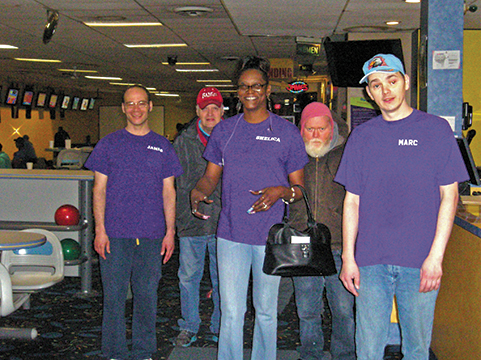
Capri Lanes in Dayton was a fun place for ACF residents this winter, as they bowled in a weekly league that took over 12 alleys on Thursday afternoons, culminating in a banquet in early May.

